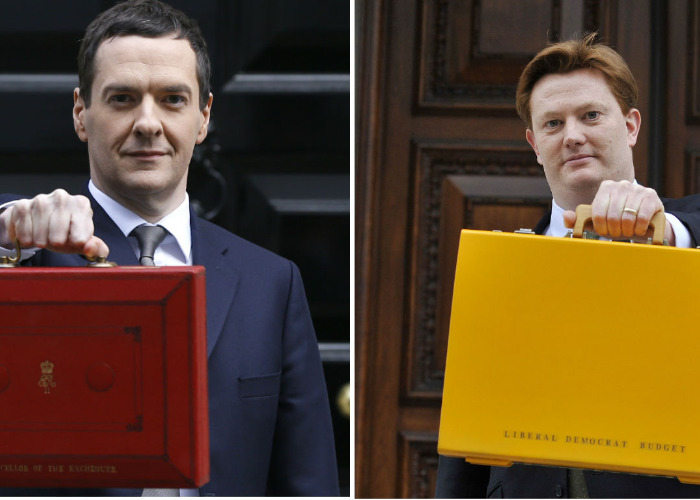The Budgets the political parties wanted to give

It was compromise for the Conservatives and the Liberal Democrats, but here's what the three parties would have done alone.
The political parties have been setting out their alternative budgets following the Coalition Government’s Budget yesterday.
Here’s what the parties would have done if they had been in sole power.
Conservatives
George Osborne said he would have gone further in raising the tax-free personal allowance on Income Tax, possibly to £12,500 from 2016/17 although he didn't quote figures. He also would have raised the higher rate (40%) tax threshold further.
And given the Conservatives have stated they would the annual benefits cap reduced from £26,000 to £23,000 “within days” of forming a new government, it’s arguably fair to say this would have been included in a solely Tory Budget.
The £12 billion of welfare cuts announced in the Budget would be detailed in a Spending Review after the election, the Tories have said.
The elephant in the chamber yesterday was arguably Inheritance Tax, as it’s well known that the Tories want to raise the threshold from £325,000 to £1 million. There was talk that there might have been a measure to remove the tax from properties up to £1 million and reduce it on properties worth up to £2 million, but that was likely vetoed by the Liberal Democrats.
Keep on top of your own budget with lovemoney's free, secure Track app
Labour
In a round of media interviews the morning after the Budget, Shadow Chancellor Ed Balls said he wouldn’t reverse any of the new measures announced in the Budget.
However, he did say he would “reverse… deeper spending cuts in the next three years”. Instead, Labour would introduce a mixture of spending cuts, of which there are no precise details yet, and tax rises for the better off.
Those tax rises include the additional (45%) Income Tax rate increasing back to 50%, and a so-called ‘Mansion Tax’ on properties valued at over £2 million.
The Minimum Wage would be increased to £8 an hour. The under-occupancy tax, better known as the ‘bedroom tax’, would be scrapped, as would the Married Couples’ Tax Allowance, and the tuition fee cap would be lowered from £9,000 to £6,000.
It would also force energy companies to freeze gas and electricity bills until 2017.
Liberal Democrats
In a piece of slightly bizarre political theatre, Chief Secretary to the Treasury Danny Alexander unveiled an alternative Budget in Parliament and even posed with a yellow version of the Budget box beforehand.
The Lib Dem plan to balance the books by 2017/18 is based on securing an additional £6 billion from tax avoiders, with £6 billion coming from tax rises. The latter would include a ‘mansion tax’ and a tax on bankers’ bonuses.
There would be also be £12 billion of government department savings and £3.5 billion off the welfare bill, compared to the £12 billion off the latter announced by the Coalition Government in the real Budget.
Keep on top of your own budget with lovemoney's free, secure Track app
More on Budget 2015:
Comments
Be the first to comment
Do you want to comment on this article? You need to be signed in for this feature